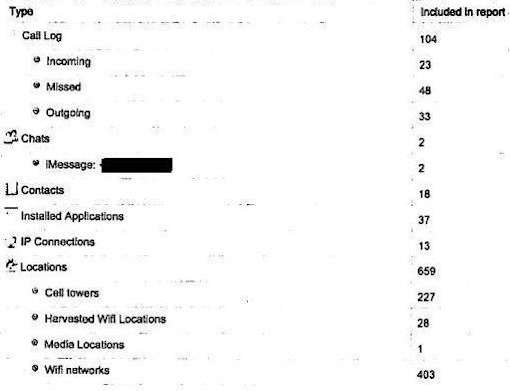The Government Can And Will Search Your iPhone


So recently there were some minor drug investigations that went to court. It was just basic stuff, but the information released as part of this case was NOT basic at all.
Do you ever get the feeling the government can go through your stuff and read your texts, only to laugh it off, thinking your phone is secure because of this, that or the other thing, and you have no reason to worry? Yeah… start worrying.
We all know the government can search your phone if you’re suspected of something, but up until now we figured that the information the government could grab and read was pretty basic. Maybe how many emails we have, or where our calls are coming from, or which stupid pictures we post on Facebook. But it’s actually much, much more extensive than that.

See that lovely image from above? I honestly think it has more information on it than I know about my own phone—like how many ‘locations’ or ‘towers’ I’ve ever been hooked into. It literally has all of your activity. Passwords, stored text messages, passwords… even applications you’ve downloaded and installed. Hopefully one of them isn’t “The Drug Network,” as in this guy’s case, because that’s more than a bit incriminating.
Immigration and Customs Enforcement (aptly nicknamed “ICE”) can literally be in your phone however it wants, it wants (if it has a reason to do so). Agents can even call your girlfriend and break up with her for you, or tell your mom the real reason you haven’t been calling her.
But think about this seriously for a moment. Before smartphones were really popular, how would police get the intelligence they found on this phone? How would they know where the phone had been, if this person was talking to other suspects, or which WiFi networks had been used in which areas? You might not think knowing which WiFi connections have been made is all that important, but what if this dude hooked up his phone to a Starbucks WiFi network where he frequently made drug deals? Yeah, that’s pretty important. And not to mention pretty invasive.
The best part of the screenshot you see is a permit wasn’t needed to get it. Yeah, you read right. In most states, police don’t need to snag a warrant to run the software on your phone. Since most police have a nifty Cellbrite machine in their cars, they could even do it when they stop you for a taillight bulb problem.
While the police man is writing you a fix-it ticket, he could be reading all those dirty texts you sent to his wife the night before, and decide to beat your face in. Or double your fine. Or worse, make you stand in traffic court line for eight hours to see a judge that doesn’t give a damn about how much you pay anyway.
In all seriousness though, digital data is just one more thing laws haven’t gotten to yet because of how innovative and new the idea is. Some courts still don’t know how to prosecute hackers and others who have stolen huge amounts of data from companies and individuals. Why would there be a law about how much an office can snoop around in your phone?
I’m not saying you should abandon the Internet (because that means you couldn’t read this, and that would be sad) and throw your phone into a lake while you build yourself a tinfoil fortress. But I am saying that—like businesses and companies—you have assets you want to protect – which means you need to consider locking down your phone in any way possible (a passcode is a good start). Take the time to be thoughtful about protecting your information, because otherwise any shmuck can come along and take something that is rightfully yours and never have to answer for it.
[Top image via Flickr/Robert Scoble]









































